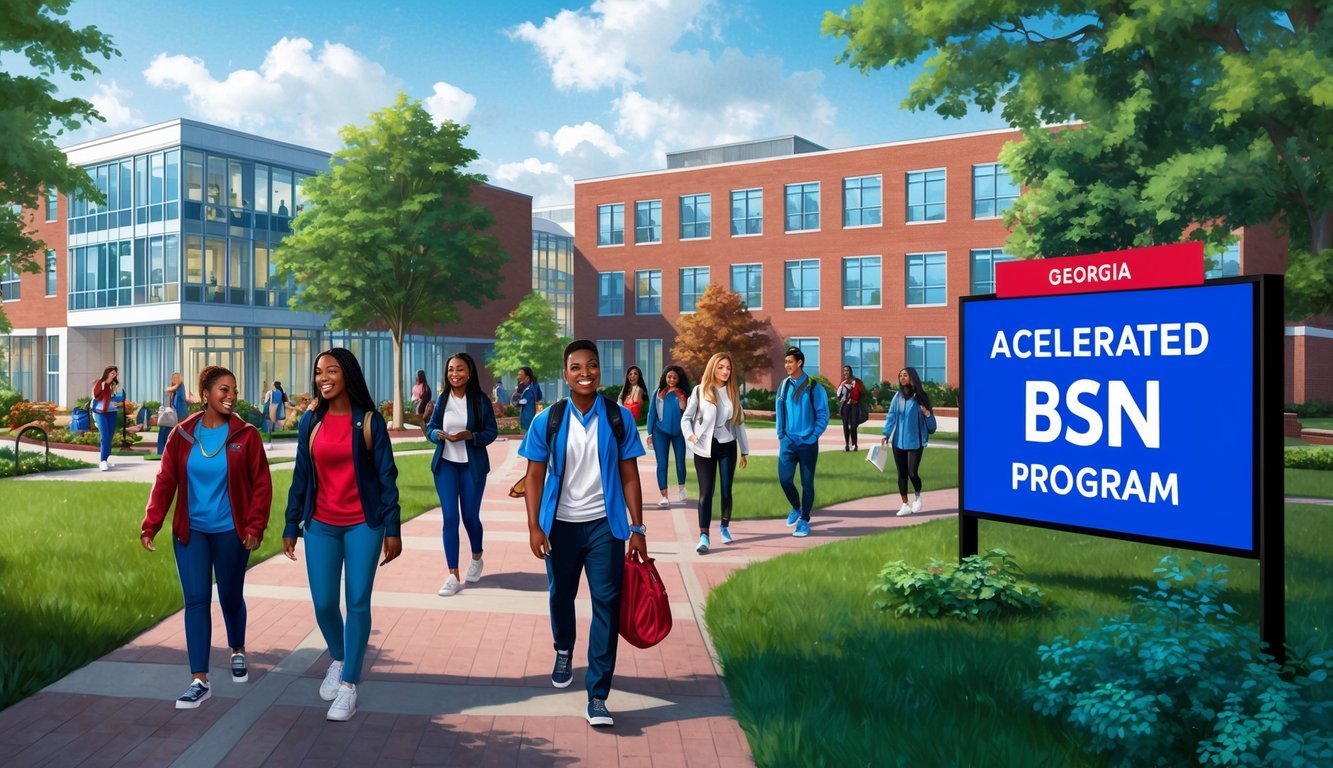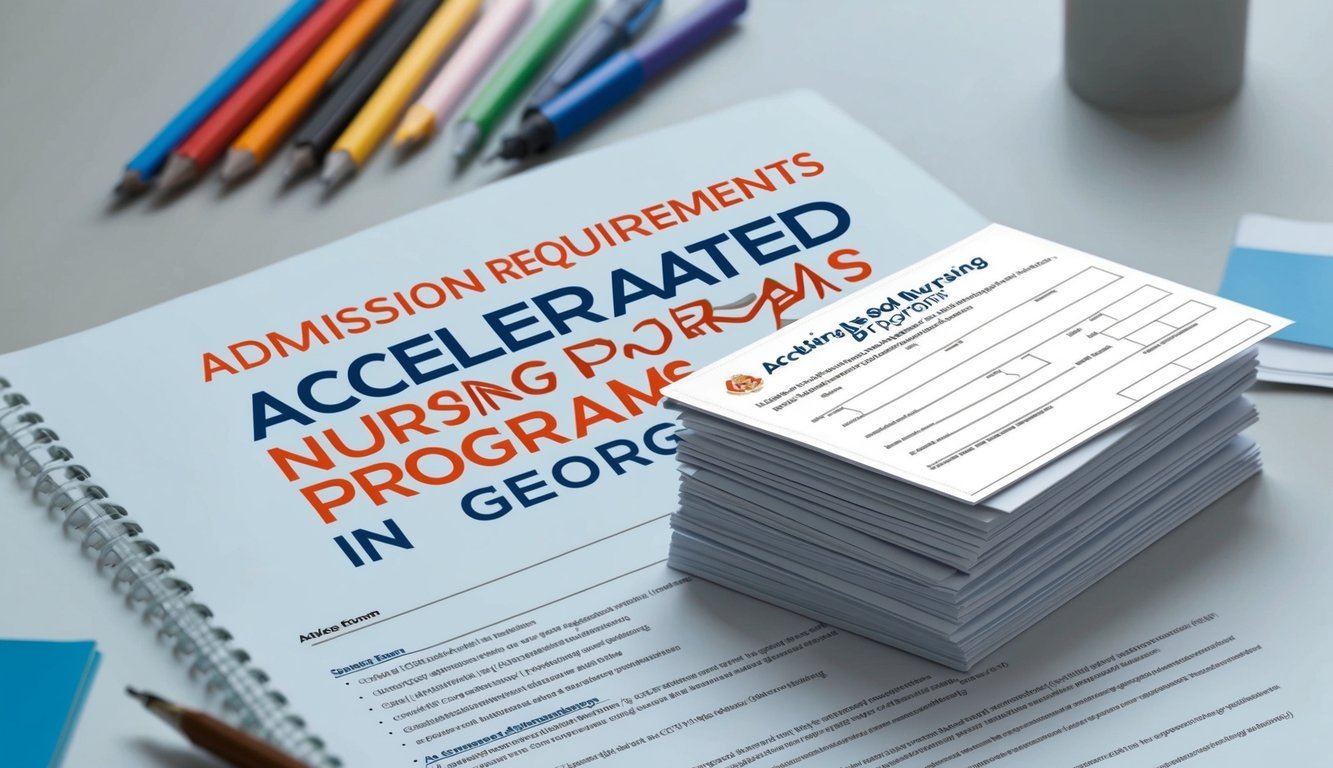If you are considering a career in nursing and already hold a bachelor’s degree in another field, accelerated nursing programs in Georgia offer a fast track to becoming a registered nurse.
These programs cater to individuals who are looking for a career change or who want to complete their education more quickly than traditional nursing pathways allow.
In Georgia, several respected institutions provide accelerated Bachelor of Science in Nursing (ABSN) options.
For example, programs at Emory University and Georgia Southern University are designed to equip you with the clinical skills and theoretical knowledge necessary for nursing practice.
With both in-person and distance options available, you can choose a learning style that fits your life.
As you explore your options, it’s essential to understand the prerequisites and program structures offered by different schools.
Many programs require completion of certain undergraduate courses and may include live online classes paired with clinical rotations in your community.
This combination ensures that you gain both theoretical insight and hands-on experience, preparing you for a successful nursing career.
Overview of Accelerated Nursing Programs in Georgia

Accelerated nursing programs in Georgia offer a streamlined pathway for individuals seeking a nursing career.
These programs, particularly Accelerated Bachelor of Science in Nursing (ABSN), allow students with prior degrees to transition into nursing much more quickly than traditional routes.
Defining Accelerated BSN Programs
Accelerated BSN programs are intensive educational courses designed for those who already hold a bachelor’s degree in another field.
The curriculum is fast-paced, typically encompassing 12 to 18 months of rigorous study.
In Georgia, several institutions offer these programs, including Emory University and Georgia Southern University.
Upon completion, graduates earn a Bachelor of Science in Nursing, preparing them to sit for the NCLEX-RN licensing exam.
This aims to address the growing shortage of registered nurses in the healthcare workforce.
Benefits of an Accelerated Nursing Program
There are numerous advantages to pursuing an accelerated nursing program:
- Time Efficiency: You can achieve your nursing degree faster than in traditional programs.
- Career Advancement: A BSN can lead to better job opportunities and higher salaries compared to an associate degree.
- Competency Development: The curriculum is designed to cover essential nursing skills and knowledge rapidly.
Furthermore, many of these programs include clinical experiences, allowing you to apply your skills in real-world settings.
As a result, you will be well-prepared for the demands of a nursing career.
Job Outlook for Registered Nurses in Georgia
The job outlook for registered nurses in Georgia is promising.
According to the U.S. Bureau of Labor Statistics, the demand for RNs is projected to grow significantly over the next decade.
Factors contributing to this growth include:
- An aging population requiring more medical care
- Advances in healthcare technology
- An increased focus on preventative care
In Georgia, registered nurses can expect competitive salaries, which can vary based on factors such as location, experience, and specializations.
For instance, in urban areas like Atlanta, the demand for RNs is even higher due to the concentration of healthcare facilities.
Taking the step to enter an accelerated nursing program positions you favorably in a booming job market.
Key Academic Institutions Offering Accelerated BSN in Georgia

Several prominent institutions in Georgia provide Accelerated Bachelor of Science in Nursing (ABSN) programs.
These programs cater to individuals holding a bachelor’s degree in another field, allowing them to achieve a nursing degree in a shorter time frame.
Below is a detailed overview of key academic institutions offering these programs.
Emory University
Emory University in Atlanta is renowned for its rigorous ABSN program.
The curriculum spans 12 months, focusing on both theoretical knowledge and clinical practice.
Classes typically include advanced healthcare concepts, pharmacology, and nursing ethics.
Students benefit from Emory’s strong ties to the healthcare community, gaining access to high-quality clinical rotations.
The program requires a minimum GPA and prior coursework in sciences, ensuring a competitive learning environment.
You can learn more about their offerings here.
Kennesaw State University
Kennesaw State University provides an intensive ABSN program designed to be completed in 15 months.
The program focuses on developing clinical skills alongside academic knowledge.
Key features include simulation labs that prepare you for real-world scenarios.
Admission requirements include a bachelor’s degree and specific prerequisite courses.
The program emphasizes close faculty interaction and a supportive learning environment, which can enhance your nursing education experience.
More details are available here.
Mercer University
Mercer University offers an ABSN program that can be completed in just 12 months.
Located in Atlanta, the program combines hands-on clinical experiences with classroom learning.
The curriculum is designed to prepare you for the National Council Licensure Examination (NCLEX-RN) upon graduation.
Mercer focuses on both academic excellence and character development, promoting a holistic approach to nursing education.
Admission is competitive, requiring a minimum GPA and successful completion of prerequisite courses.
Explore their program here.
Georgia Southern University
Georgia Southern University features an ABSN program that allows students to obtain their degree in three semesters.
This format is particularly beneficial for those looking to transition into nursing quickly.
The program is available to individuals with a bachelor’s degree in any field.
Students engage in hands-on training, preparing for various nursing roles in clinical settings.
The university supports students with resources for academic success throughout their studies.
Information on this program can be found here.
Georgia Baptist College of Nursing
Georgia Baptist College of Nursing is part of Shorter University.
Its ABSN program is designed for individuals with a non-nursing bachelor’s degree and can typically be completed in 12 months.
The college emphasizes a Christian worldview in nursing education, integrating faith with healthcare practice.
Students gain practical experience through clinical rotations at various healthcare facilities.
Admission is competitive, and the program outlines a clear path to licensure.
For further details, check their offerings here.
Admission Requirements and Application Process

Understanding the admission requirements and application process is crucial for prospective students looking to enter accelerated nursing programs in Georgia.
This section outlines the essential prerequisites, the HESI admission assessment, and important application deadlines.
Prerequisite Courses
Before applying to an accelerated nursing program, you must complete certain prerequisite courses.
Common requirements include:
- Human Anatomy and Physiology (typically 8 credits)
- Microbiology (4 credits)
- Nutrition (3 credits)
- Statistics (3 credits)
These courses ensure you have a foundational knowledge necessary for nursing education.
Some programs may also require psychology or microbiology.
It is vital to confirm specific course requirements with your chosen institution.
Your completed courses must be from an accredited institution.
Maintain a minimum GPA, often around 3.0, as this is a typical expectation among nursing programs.
HESI Admission Assessment
Most accelerated nursing programs require you to take the HESI Admission Assessment exam.
This test evaluates your knowledge in key areas such as:
- Mathematics
- Reading Comprehension
- Grammar
- Vocabulary
You should prepare adequately, as scores are considered during the admission process.
Some programs may establish a minimum score for eligibility, so check the criteria for your target institution.
Consider utilizing study resources available online or through local libraries where you can find practice tests and review materials.
A solid score on the HESI can significantly enhance your application.
Application Deadlines and Checklist
Each nursing program has its own application deadlines, which can vary significantly.
It’s essential to stay informed about these dates.
Generally, applications are accepted once a year, with deadlines often in the spring or early summer.
A typical application checklist includes:
- Completed application form
- Official transcripts
- HESI Admission Assessment scores
- Letters of recommendation
- A personal statement
Ensure that you gather all necessary documents and submit them before the deadline.
Delays in the application process can negatively impact your chances of admission.
Staying organized is crucial for a smooth application experience.
Curriculum and Clinical Training Components

In accelerated nursing programs in Georgia, the curriculum is designed to provide both foundational knowledge and practical skills necessary for nursing practice.
The focus is on core coursework, clinical experiences, and simulated training, ensuring you receive a comprehensive education.
Core Nursing Coursework
The core nursing coursework in accelerated programs typically includes fundamental subjects such as anatomy, pharmacology, and nursing theory.
Emory University and Augusta University, for example, integrate rigorous academic content that aligns with the latest healthcare standards.
You will encounter topics like:
- Health Assessment
- Pathophysiology
- Nursing Research
These courses emphasize critical thinking and decision-making, equipping you for diverse patient scenarios.
Moreover, coursework often involves group projects and discussions that enhance collaborative skills essential in healthcare settings.
For more information on specific programs, consider visiting Emory University’s nursing program.
Clinical Experience Expectations
Clinical experience is a vital component of your training.
Most programs require you to complete a set number of clinical hours in various healthcare settings.
You will gain hands-on experience under the supervision of licensed nurses and faculty.
Expect to provide care in:
- Hospitals
- Clinics
- Long-term care facilities
This exposure helps you apply theoretical knowledge to real-world situations, enhancing your clinical skills and patient interactions.
The clinical training structure ensures you develop competencies in areas like:
- Patient assessment
- Medication administration
- Emergency response
Many institutions, such as Albany State University, outline their clinical requirements clearly, emphasizing the importance of documented hours and skills assessments.
Simulation Labs and Clinical Skills
Simulation labs play a crucial role in your training by offering a safe environment to practice clinical skills.
These labs utilize technology to create realistic patient scenarios.
You will engage in various simulations that may include:
- CPR techniques
- Patient care scenarios
- Medication management
The objective is to build your confidence and technical ability before entering real clinical settings.
Additionally, skills labs allow for repeated practice, ensuring mastery of essential skills.
Many programs also use high-fidelity mannequins to simulate medical emergencies, giving you a chance to experience critical thinking under pressure.
Financial Considerations for Prospective Students

When exploring accelerated nursing programs in Georgia, understanding the financial aspects is crucial.
Tuition and fees, along with available financial aid and scholarships, significantly impact your educational investment.
Knowledge of these elements can help you make informed financial decisions.
Understanding Tuition and Fees
Tuition for accelerated nursing programs in Georgia varies by institution and program length.
Below is a summary of estimated tuition costs for some programs:
| Institution | Estimated Tuition Cost (per credit hour) | Program Length |
|---|---|---|
| Emory University | $1,600 | 12 months |
| Georgia Southern University | $169.33 | 3 semesters |
| Albany State University | $169.33 | 5 semesters |
In addition to tuition, you should be aware of additional fees, such as application fees, lab fees, and clinical fees.
These can add up, impacting your total educational expenses.
Review each program’s website for specific details regarding tuition and any potential costs that may arise during your studies.
Financial Aid and Scholarships
Various financial aid options are available to alleviate the financial burden.
You can apply for federal financial aid through the FAFSA.
The FAFSA takes into account your financial situation.
This may include grants, loans, and work-study programs.
Scholarships also play a vital role in funding your education.
Many institutions offer scholarships targeting nursing students.
These can include merit-based and need-based aid.
For example, the Emory University nursing program provides several scholarships for eligible students.
It’s essential to research and apply for scholarships early, as funds can be limited.
Utilize resources at your prospective schools and look for external scholarship opportunities through organizations like the American Association of Colleges of Nursing.

